|
|
|
Sort Order |
|
|
|
Items / Page
|
|
|
|
|
|
|
| Srl | Item |
| 1 |
ID:
050414
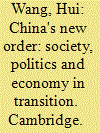

|
|
|
|
|
| Publication |
Cambridge, Harvard University Press, 2003.
|
| Description |
xi, 239p.
|
| Standard Number |
0674009320
|
|
|
|
|
|
|
|
|
|
|
|
Copies: C:1/I:0,R:0,Q:0
Circulation
| Accession# | Call# | Current Location | Status | Policy | Location |
| 047634 | 306.0951/WAN 047634 | Main | On Shelf | General | |
|
|
|
|
| 2 |
ID:
071328


|
|
|
|
|
| Publication |
Santa Monica, Rand Corporation, 1992.
|
| Description |
xxi, 112p.
|
| Standard Number |
0833012924
|
|
|
|
|
|
|
|
|
|
|
|
Copies: C:1/I:0,R:0,Q:0
Circulation
| Accession# | Call# | Current Location | Status | Policy | Location |
| 034171 | 355.610973/HOS 034171 | Main | On Shelf | General | |
|
|
|
|
| 3 |
ID:
192398
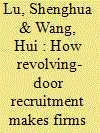

|
|
|
|
|
| Summary/Abstract |
The fact that firms seek political connections through revolving-door recruitment is widely acknowledged around the world. Using an original database including the information of listed firms' board members and parcel-level land transaction records, this paper documents how revolving-door recruitment makes firms stand out in China's land market. We show that firms with revolving-door recruitment receive special deals in land transactions, which are simultaneously reflected in the quantity and price of land. Specifically, connected firms buy more parcels and larger areas of land in the primary land market. Due to the particularity of industrial land, price discounts are only identified for commercial and residential land, while not for industrial land. Measuring economic activity by night light intensity, we find no evidence that land transaction under the influence of political connections has a negative impact on economic activity on land. Our research advances the understanding that the state-business relationship is an essential factor in resource allocation in an emerging market with government intervention.
|
|
|
|
|
|
|
|
|
|
|
|
|
|
|
|
| 4 |
ID:
143370


|
|
|
|
|
| Summary/Abstract |
We use household and farm-plot level data from a two period panel survey covering six provinces in China to explore how tenure security, especially issuance of land documents, affected people's behavior in China's rural land rental market. A correlated random effect model is used to account for the endogeneity of document issuance and land reallocations. The econometric analysis shows that possession of documents and fewer major land reallocations encourage households to engage in land renting to non-family members, and the effects of land right documents are stronger in 2008 than in 2000.
|
|
|
|
|
|
|
|
|
|
|
|
|
|
|
|
| 5 |
ID:
181880
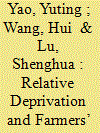

|
|
|
|
|
| Summary/Abstract |
Land expropriation is a common source of grievances and resistance from farmers in China. Based on survey data, we propose that farmers’ sense of relative deprivation is one of the causes. Our study focuses on compensation distribution in villages, where village collectives are the reference for comparison. Relative deprivation is measured by the ratio of farmer compensation to the standard government compensation; the gap between these is roughly the compensation retained by village collectives. The outcome variable is farmers’ willingness to participate in village governance. The empirical test is based on 2017 data from the Chinese Family Database of Zhejiang University and compensation standards data collected by the authors. Nearly 75% of respondents received less than standard compensation, which indicates widespread relative deprivation. And the greater the relative deprivation of farmers, the more willing they are to participate in village governance.
|
|
|
|
|
|
|
|
|
|
|
|
|
|
|
|
| 6 |
ID:
121741
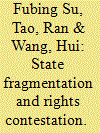

|
|
|
|
|
| Publication |
2013.
|
| Summary/Abstract |
The functionalist reasoning of institutional changes builds on individual rationality and explains institutional changes from the demand side. While insightful, a comprehensive understanding also needs to take into account the supply side. The state, as the ultimate supplier of institutional changes, plays the pivotal role of agency; therefore, its willingness and ability decide how such regime change occurs and what particular form the new regime takes. Since the mid-1990s, the Chinese economy has embarked on a path of rapid industrialization and urbanization. The contestation over rural land development rights in China offers an excellent case to illuminate the importance of state agency in institutional changes. Drawing on case studies in China's three major urbanizing regions, this article analyzes how villages brought their own land directly to the land market and reaped handsome profits. We argue that the three successful cases, Nanhai in Guangdong, Kunshan in Jiangsu and Zhenggezhuang in Beijing, all represent a product of active agency on the supply side. The Chinese state's fragmented authority provides a favorable institutional environment for such changes.
|
|
|
|
|
|
|
|
|
|
|
|
|
|
|
|
| 7 |
ID:
186943


|
|
|
|
|
| Summary/Abstract |
Land expropriation, where peasants’ property rights are encroached by the state, has been recognized as a primary source of social dissension in rural China. Since the end of the last century, the Administrative Litigation Law (ALL) has provided people with a legal weapon to defend themselves against violations by state power. Drawing on the theory of relative deprivation, this paper proposes that peasants are more likely to sue the state when they feel deprived. To examine this hypothesis, we first present a case study to depict the causal process and then use quantitative research to improve the external validity of our findings. We created a novel and unique database of prefecture-level administrative litigations and relative deprivation for Poisson regression analysis. The quantitative results prove that the more peasants feel relatively deprived, the more likely they are to sue the state. Furthermore, the positive effect of relative deprivation on administrative litigations has become more significant over time, implying peasants’ growing awareness of legal resistance. This paper concludes that a critical step towards eliminating social inequity and maintaining social stability in rural China is to reduce the relative deprivation of peasants by, for example, allowing them to share in land value appreciation in the process of urbanization.
|
|
|
|
|
|
|
|
|
|
|
|
|
|
|
|
| 8 |
ID:
086477
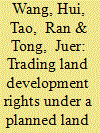

|
|
|
|
|
| Publication |
2009.
|
| Summary/Abstract |
China's state planned land use system, including regulations such as setting planned quotas for land use, basic cropland preservation, and pursuing a balance between the conversion of arable land into non-agricultural use and the supplement of new agricultural land, has substantially constrained the economic growth of industrial provinces in China. This article explores the innovative reforms adopted by Zhejiang Province through land development rights (LDR) transfer within a locality and LDR trading across localities. We argue that there is a "Zhejiang model of LDR transferring and trading," which, we believe, has significant implications not only for fostering an efficiency-enhancing market for land development rights and agricultural land preservation, but also for optimal use of land and a more balanced regional development. One important policy issue relating to China's rural land system is that under China's land requisition system, farmers are usually under compensated for urban land-taking.
|
|
|
|
|
|
|
|
|
|
|
|
|
|
|
|
|
|
|
|
|